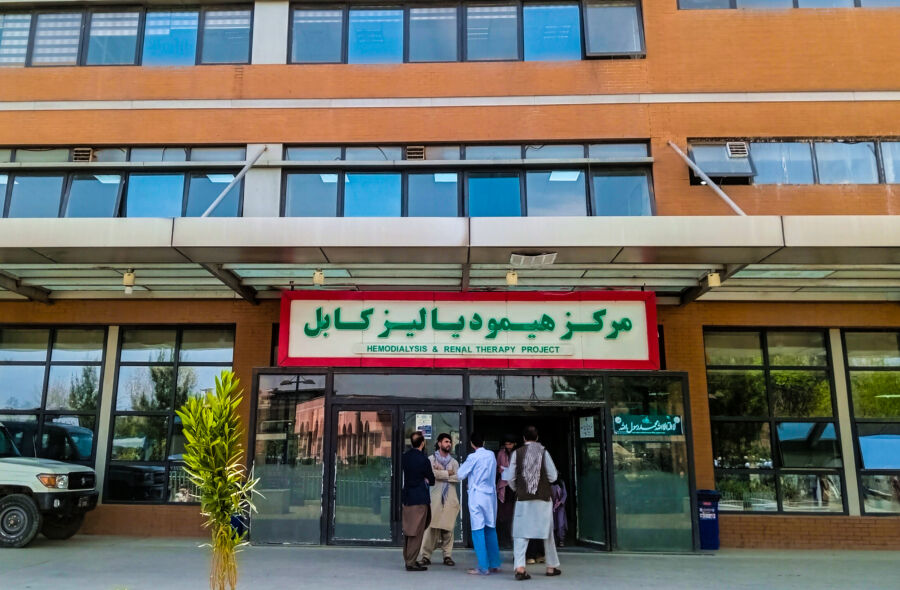KABUL (SW) – “I have been diagnosed with kidney failure for about two years. I was in a coma for almost five days. If I don’t get dialysis, I will pass out,” these are the words of Aman Jan, a patient suffering from kidney failure who came from Parwan for treatment to Kabul.
Complaining about his bad health, he says that he went to Herat a month ago because of the lack of a kidney transplant center near home.
Health officials at the Jumhuriyet Hospital say that the number of kidney failure patients in Afghanistan has increased compared to last year.
Harun Hajar, the head of “Kabul Hemodialysis Center” at Jumhuriyet Hospital, told Salaam Watandar that more than 80 patients come to this center for treatment every day, and most of these patients are people over 40 years old, including children and young people.
What kidney fails?
Kidney is an organ of the body that works to clean the blood and remove excess substances in the body. When the kidneys work less than normal, a person suffers from kidney failure. There are two types of kidney failure; acute kidney failure, in which the kidneys stop functioning suddenly, and this state is temporary, and more often, the kidneys return to normal or close to it, and another type, chronic kidney failure, which is the most severe type of this disease, and in this case, the kidneys are so damaged they see that they are no longer able to perform activities.
Causes of kidney failure
Although doctors state many different factors; however, high blood pressure, sugar/diabetes, hereditary and congenital kidney diseases, kidney stones, and excessive use of drugs, especially painkillers, are considered to be the main causes of kidney failure. According to doctors, the cause of kidney failure is different in patients with acute and chronic forms of this disease.
Salahuddin Oriakhil, a doctor at Jumhuriyet Hospital, says: “Many times, diarrhea, vomiting, and in women, bleeding after childbirth are among the reasons why a person gets acute kidney disease, but the microbialization of the kidneys and the non-treatment of acute kidney disease causes a person to develop chronic kidney disease.
.

Treatment methods
The process of treating kidney failure is time-consuming, and patients must always be under the supervision of a doctor and undergo dialysis. Dialysis is a type of medical treatment for blood purification, through which excess blood substances are directly removed from the patient’s blood. After a period of several months of dialysis, it is possible for the kidneys to function again in people with acute kidney failure. But these patients must use the medicine continuously. Also, for the treatment of patients with chronic kidney failure, permanent dialysis or kidney transplantation is the only option.
Harun Hajer, the head of “Kabul Hemodialysis Center” at Jumhuriyet Hospital, says that patients undergo hemodialysis for up to four hours a day to clean their blood. He added: “Patients whose kidnies are not too damaged are discharged after dialysis; but patients who are in serious condition are admitted to the nephrology department of this hospital.”
Although the treatment method of dialysis and kidney transplant is the only option for the treatment of kidney failure, but according to doctors, sometimes these treatment methods cannot save a person from this disease, and three or four months after it is done, dialysis disorders may cause the death of the patient.
Limits of access to treatment
With the increase of kidney failure disease in Afghanistan, patients suffering from this disease all over the country do not have access to medical facilities and centers. The Ministry of Public Health provides services to these patients in 15 provinces where only one treatment center is active in each province.
Fazlul Haq, a patient at the Jumhuriyet Hospital, who was forced to bring his brother to Kabul for treatment due to the lack of dialysis center in Parwan, says that many times, the lack of dialysis machine in this center has caused him to take his patient to a private hospital and pay double the cost. He added: “Many times here, the device is blocked and we have to go to a private hospital. I have taken my brother several times to a private hospital, which only charges 2,000 for dialysis.”
In the same way, other patients and patients in this hospital say that they had to borrow or sell their land and gardens to buy dialysis materials. They want the cooperation of the government in this direction.
Jumhuriyet hospital is the only advanced center for the treatment of kidney failure, and patients are sent to this hospital from all over the country. The officials of the hemodialysis and nephrology departments in the hospital say that despite having 26 dialysis machines and providing 90% of medical services in this hospital, they are also faced with the lack of dialysis machines, doctors and nurses and the lack of dialysis materials in this center. They call it a serious challenge in the way of treating patients. Haron Hajar says: “For dialysis of a patient, four items are needed, of which we only have one item. If we dialyze the patients three times a week according to the standard, six thousand sets are needed per month. The number of dialysis machines should also be doubled.”
Mirwais Akbari, the head of the Nephrology Department of Jumhuriyet Hospital, also says that nearly 30 patients visit this department every day, and currently, 16 patients are hospitalized, half of whom need a kidney transplant. He adds: “We have two doctors in this department. There are four doctors from the internal department who work with us on a monthly basis. This department is urgent and we must have an ICU with well-equipped facilities and sufficient personnel.”
The lack of a kidney transplant center in government hospitals is another problem that has forced patients with this disease to go to private hospitals or abroad for this procedure.
Although the exact statistics of the number of kidney failure patients in Afghanistan are not known, the officials of the Ministry of Public Health, confirming the increase in the number of people suffering from this disease and the lack of treatment centers in some provinces, say that they are working to solve the problems in this field.
Sharaf Zaman, the spokesperson of the Ministry of Public Health, told Salam Watandar: “We have started several projects to treat patients and have established new treatment centers in a number of provinces such as Helmand, Zabul and Nangarhar. Our goal is for the patients to be treated in their provinces so that they don’t have to come to Kabul.”
It should be mentioned that in the past few years, several private hospitals have started their activities in the field of kidney failure treatment, especially kidney transplant.
ENDS






